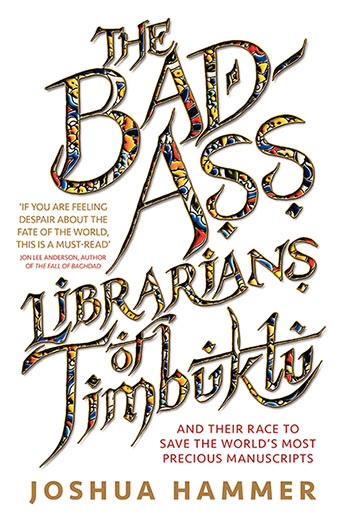 Reviewed by Sue Bond
Reviewed by Sue Bond
The Bad-Ass Librarians of Timbuktu and Their Race to Save the World’s Most Precious Manuscripts
by Joshua Hammer
Allen & Unwin
ISBN 9781760294489, September 2016, paperback
This is an important subject treated with seriousness by the author, who is a journalist of some standing and the author of three other books. The title is somewhat misleading, however, as the librarians are not so much ‘bad-ass’ as courageous and dedicated to their quest to save centuries-old Islamic and secular manuscripts on a range of topics from destruction by militants of Al Qaeda.
It does tell the story of how Al Qaeda came to be in Mali in 2012 and how they rose to attain a degree of power, occupy Timbuktu and terrorise the population, and plan to invade and overwhelm the rest of Mali. Ultimately, they did not succeed, and the story of the battle against them is well described. Hammer has visited Timbuktu over the last twenty years, so has not only documented this terrorist period, but also the rescue by one of the heroes of this story of a magnificent collection of manuscripts from the north of Africa. His name is Abdel Kader Haidara and he was employed to bring these precious manuscripts together to form a government library in Timbuktu.
When Al Qaeda came to town, Haidara realised he had to save the manuscripts from possible destruction by the fundamentalist group. So all but a small number of the 350 000 volumes were spirited out without the knowledge of Al Qaeda, described in a series of dramatic scenes. It is an extraordinary story.
What I would have liked are some photographs of the manuscripts, the city, and the library, as well as some of the people. Not necessarily those involved in the rescue in case it was dangerous for them to be photographed and published in a book, but some pictures to give the reader an idea of the culture and the books themselves. A map or two would also have helped greatly in situating Mali and surrounding countries and the cities and towns mentioned in the text. I also felt that the militants were actually given too much space in the book, and that their story could have been condensed, giving more to Mali and its people and how they use their manuscripts today.
What I liked about the book was the approachably written history of scholarship in Timbuktu. Hammer tells of Hassan Mohammed Al Wazzan Al Zayati, who wrote under the name of Leo Africanus, and how he described the, to him, astonishing scholarship in the city which was filled with students who were admirably supported. Hammer also stresses that the Islam practised by its people was a tolerant and life-loving religion, not the strict and harsh version shown by fundamentalists. The history of the area is turbulent, like many others, and the clash between the two types of Islam featured over several centuries. The love of the population for their vast and varied collection of manuscripts is uppermost, and the fact that so many of them have survived into the twenty-first century is a testament to how they were and are prized.
About the reviewer: Sue Bond is a writer and reviewer living in Brisbane.